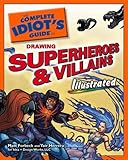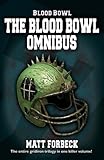Discussing Eberron and Blood Bowl fiction with Matt Forbeck
Posted By Flames On August 25, 2008 @ 6:30 am In Authors,Interviews | 3 Comments
 [1]Matt Forbeck writes about superheroes. And mutants. And parodic, homicidal American football players in his Blood Bowl novels. He does some Weird West, too.
[1]Matt Forbeck writes about superheroes. And mutants. And parodic, homicidal American football players in his Blood Bowl novels. He does some Weird West, too.
In fact, there’s more than a little cowboy thrown into every thing he does. Check out the Lost Mark Trilogy for an idea of how seamlessly the Wild West and heroic fantasy can meld into something much bigger than the sum of both genres.
For the last twenty years, most of Forbeck’s work—game design, fiction, non-fiction—has in some way or another been connected to a shared world or licensed setting. He has worked with many settings from just about every possible angle—writer, editor, and developer.
A while back, Forbeck and I talked about writing in general and shared world writing in particular.
JONES: What are the advantages and disadvantages of writing in a shared world?
 [2]FORBECK: The best part about writing in a shared world is that someone else has done much of the heavy lifting for you. Many of the details about the setting and how it works are already set in stone, and you don’t have to worry about constructing these things.
[2]FORBECK: The best part about writing in a shared world is that someone else has done much of the heavy lifting for you. Many of the details about the setting and how it works are already set in stone, and you don’t have to worry about constructing these things.
The biggest disadvantage, of course, is the other edge of that same sword. Since many things about the world have already been decided, there are constraints you have to live within. You can’t just do whatever you want.
[You have to] learn as much as you can about the setting before you begin. This saves lots of time and frustration down the road. There’s little worse than coming up with a great story and then realizing you built it upon premises that are flat-out wrong.
JONES: If a lot of the setting is done for you, does it force you to focus more on the characters and the story? It seems to me that you couldn’t really hide behind world-building and would have to focus on what YOU bring to the world and not on the world itself.
FORBECK: A good writer should always pay attention to the characters and the story, so working in a shared-world setting doesn’t force you to do so, as much as it frees you. It gives you back the time you’d otherwise spend on world building.
JONES: If writing in a shared world frees you to focus on character and story, why then does shared-world writing get such a bad rap by so many people? It seems to me that character and story are not only the most important part of a good story, but also the hardest part of writing. Yet, shared world, game-based, media tie-in fiction all gets treated as second-class citizens of the literary world. Seems to me, maybe, a lot of people are missing the boat…
 [3]FORBECK: These are all great points. The International Association of Media Tie-In Writers (IAMTW.org) started up 2005 with the ambition to help change minds about books like these. There are a slew of articles posted there that can help answer your question.
[3]FORBECK: These are all great points. The International Association of Media Tie-In Writers (IAMTW.org) started up 2005 with the ambition to help change minds about books like these. There are a slew of articles posted there that can help answer your question.
One of the reasons I think tie-ins get a bad rap is that the community of dedicated fans in most genres prefers to read things new and different. It’s only natural, as these people spend a lot of time reading and know all the tropes of their chosen genres, front and back. So they focus on what’s novel in novels rather than just reading good stories well told.
Check the sales figures, though, and you’ll see that most tie-ins outsell most original work. There are lots of reasons for this, not the least of which is the trust that people have in the brands those shared worlds have built. The readers, who vote with their dollars, seem to know what they like.
JONES: Capturing the right tone seems to be crucial when working in a shared world. How would describe the tone of Eberron, and since you did work so early in the series, what did you do to be sure that you had captured it.
FORBECK: My editor Mark Sehestedt pounded this one into me. Eberron is pulp fantasy, D&D mixed with Indiana Jones. To get that across: it’s cliffhanger, cliffhanger, cliffhanger. In my Eberron books, there are all sorts of twists and turns, and the chapters are all short and punchy, each ending with some kind of cliffhanger.
JONES: Well, when you put it that way (a pulpy mix of D & D and Indiana Jones) it seems like there’s no way the Eberron novels could be anything but great. Yet, reviews were mixed for all the Book One’s and very strong for the Book Two’s… Was this expected? A surprise? Growing pains? Is it a case of readers becoming more comfortable with a new world or with the world finding settling in or what?
 [4]FORBECK: Probably a combination of all those things. In the case of both Keith Baker and me, our first Eberron novels were our first novels of that length. (I’d written a Knights of the Silver Dragon novel, but it was less than half as long as Marked for Death.) I’d like to think both of us improved as writers with our later books. I’m certain I did, although I haven’t had a chance to read Keith’s second novel yet.
[4]FORBECK: Probably a combination of all those things. In the case of both Keith Baker and me, our first Eberron novels were our first novels of that length. (I’d written a Knights of the Silver Dragon novel, but it was less than half as long as Marked for Death.) I’d like to think both of us improved as writers with our later books. I’m certain I did, although I haven’t had a chance to read Keith’s second novel yet.
Also, when Keith and I started writing our novels, the Eberron Campaign Setting hadn’t been published. The first I saw of it was as a 12-page brief. Although I’m sure Keith knew a bit more about the world than I did when he started writing, there were still huge gaps in the setting at the time, things we had to try to avoid stepping into without really knowing where they were. This made the process that much more challenging. With the later books, we stood on firmer ground.
JONES: So then did the first two novels contribute to the expansion of the campaign setting? I’ve heard of shared worlds having a “bible” that the authors draw on to maintain consistency. What goes into building a world’s bible?
 [5]FORBECK: These days, the Eberron Campaign Setting (ECS) serves as the line’s primary bible. When Keith and I started writing, we didn’t have that to refer to, so it often felt like dancing in the dark, trying hard not to step on anyone’s toes.
[5]FORBECK: These days, the Eberron Campaign Setting (ECS) serves as the line’s primary bible. When Keith and I started writing, we didn’t have that to refer to, so it often felt like dancing in the dark, trying hard not to step on anyone’s toes.
The first novels and the setting were developed in parallel, but the RPG book always took precedent. I suspect as time rolls on that the RPG authors will incorporate some of the elements from the books, although they’re not obligated to do so.
Wizards of the Coast has since developed a writers’ guide for Eberron that features details not included in the ECS. It’s packed with things like proper punctuation, information about the moons, and other helpful bits of information.
When developing a bible, you need to make clear the basics of the setting, the scope, the tone, and so on. If there’s no central arbiter of what’s right or not, you need to have some means of resolving conflicting ideas, too.
As you build the bible, you discover what questions need to be answered. A lot of it depends on the writers’ intent for their stories. With some writers, the kind of currency doesn’t matter, whereas with others it’s a vital detail. You could do worse than to pick up an RPG setting book and modeling your bible on that, although that may bring you more detail than you care to deal with. It’s easy to get carried away in the creating of the world and forget about getting down to writing the actual stories.
JONES: Which of your shared worlds books would you say is the best introduction to your work?
FORBECK: The obvious choice would be Marked for Death, but I’m the first to admit that it doesn’t stand well on its own. Also, the second book in that trilogy, The Road to Death, is a better read. If you don’t mind jumping into the middle of a story, I’d try that one.
Blood Bowl is a fine standalone book, but it’s hyper-violent and humorous, which makes for a strange mix. Still, it’s a lot of fun and turns some of the standard fantasy tropes on their ear.
JONES: Can you recommend some other particularly successful examples of shared world writing?
FORBECK: The Thieves’ World anthologies are great. They were one of the first such settings to get lots of use by a wide cast of top-notch authors usually known for their original work.
You can find similar anthologies for Star Wars, Vampire: The Masquerade, Dragonlance, and the Forgotten Realms. There’s one for Eberron, Tales of the Last War.
JONES: Are you working on any shared world fiction projects right now and, if so, can you tell me a little about it?
FORBECK: I am, and I can’t. Well, that’s dull, so let me say that, at the moment, I’m negotiating to write a novel based on a popular MMO, and I’m sure there will be more such books in my future.
Interview by Jeremy Jones
Visit www.forbeck.com [6] for the latest updates on Matt’s upcoming fiction, games and other projects.
Article printed from Flames Rising: https://www.flamesrising.com
URL to article: https://www.flamesrising.com/matt-forbeck-interview/
URLs in this post:
[1] Image: http://www.amazon.com/gp/product/1592577954?ie=UTF8&tag=flamesrising-20&linkCode=as2&camp=1789&creative=9325&creativeASIN=1592577954
[2] Image: http://www.amazon.com/gp/product/1844165159?ie=UTF8&tag=flamesrising-20&linkCode=as2&camp=1789&creative=9325&creativeASIN=1844165159
[3] Image: http://www.amazon.com/gp/product/0345499050?ie=UTF8&tag=flamesrising-20&linkCode=as2&camp=1789&creative=9325&creativeASIN=0345499050
[4] Image: http://www.amazon.com/gp/product/0786939877?ie=UTF8&tag=flamesrising-20&linkCode=as2&camp=1789&creative=9325&creativeASIN=0786939877
[5] Image: http://www.amazon.com/gp/product/078693610X?ie=UTF8&tag=flamesrising-20&linkCode=as2&camp=1789&creative=9325&creativeASIN=078693610X
[6] www.forbeck.com: http://www.forbeck.com
Click here to print.